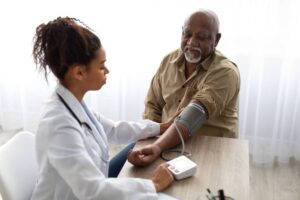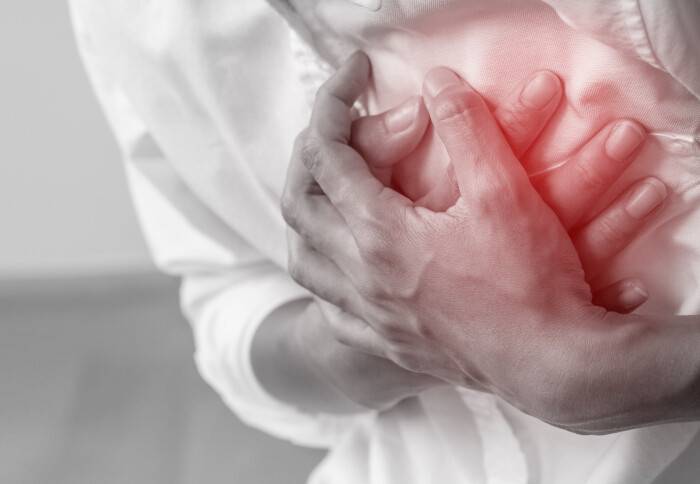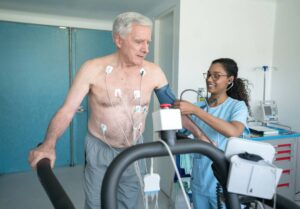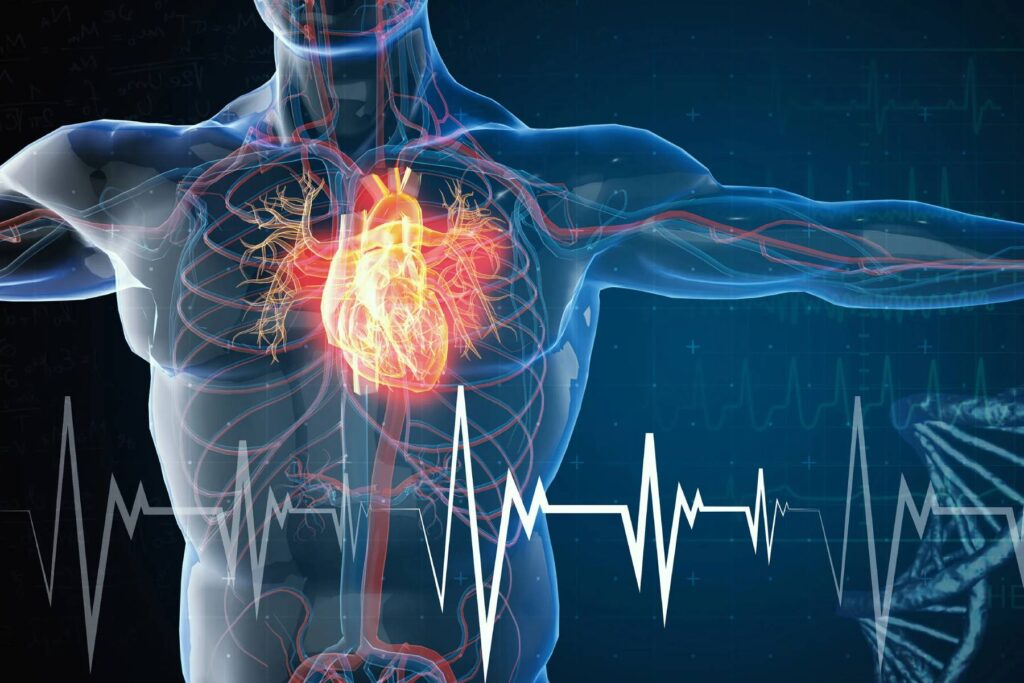A heart attack is a wake-up call, and for many, the fear of having another one looms large. You may be asking yourself, “What are the chances of getting a second heart attack?” It’s completely natural to worry about your heart health after the first event, but understanding the risks and how to prevent them can make a big difference.
In this blog, we’ll explore the factors that influence your risk, how your heart health changes after the first heart attack, and most importantly, what you can do to protect yourself. Keep reading to learn how to reduce your chances of facing heart problems again.
Contents
- 1 Factors That Influence the Risk of a Second Heart Attack
- 2 How Your Heart Health Changes After a First Heart Attack
- 3 How Likely Is a Second Heart Attack After the First One?
- 4 How To Prevent a Second Heart Attack?
- 5 How Cardiac Rehabilitation Helps in Preventing a Second Heart Attack
- 6 Can a Second Heart Attack Be Prevented Completely?
Factors That Influence the Risk of a Second Heart Attack
 Several factors can increase your risk of having a second heart attack. Here are the main risk factors:
Several factors can increase your risk of having a second heart attack. Here are the main risk factors:
- High Cholesterol
High levels of LDL (bad cholesterol) can cause plaque buildup in your arteries, narrowing them and restricting blood flow to the heart. - Smoking
Smoking damages your blood vessels, increases blood pressure, and reduces oxygen in the blood, all of which put additional stress on your heart. - Lack of Physical Activity
A sedentary lifestyle can contribute to weight gain, high blood pressure, and high cholesterol, all of which increase the risk of another heart attack. - Poor Diet
A diet high in processed foods, sugar, salt, and unhealthy fats can increase your cholesterol and blood pressure, making your heart work harder. - Stress
Chronic stress can lead to high blood pressure, elevated heart rate, and unhealthy behaviors (like overeating or smoking), all of which can increase the risk of another heart attack. - High Blood Pressure
High blood pressure can damage the arteries over time, leading to a higher risk of a heart attack. - Diabetes
High blood sugar from diabetes can damage blood vessels and increase the risk of heart disease. - Family History
If you have a family history of heart disease, you may be at a higher risk for a second heart attack.
How Your Heart Health Changes After a First Heart Attack

A heart attack doesn’t just impact you in the short term—it can leave lasting effects on your heart health. After the first heart attack, your heart might be more vulnerable, and its function can change in several ways. Here’s what happens to your heart after the first event:
Scar Tissue Formation
- What happens: When a heart attack occurs, the affected area of the heart muscle may be damaged and replaced with scar tissue. This means your heart may have to work harder to pump blood, which can lead to fatigue and strain over time.
Damage to Heart Muscle
- The heart muscle itself can become weakened during a heart attack, especially if the blood supply to a large portion of the heart is blocked for an extended period. This weakened muscle may not be able to pump blood as effectively, which can affect your overall heart function and increase the risk of heart failure.
Weakened Blood Vessels
- This can result in narrowed arteries or weakened blood vessel walls, which can reduce blood flow to the heart. This restricted blood flow can make it harder for your heart to get the oxygen and nutrients it needs to function properly, increasing the risk of future heart problems.
Increased Risk of Arrhythmias
- Scar tissue and damage to heart muscle fibers can interfere with the heart’s normal electrical signals, leading to arrhythmias (irregular heartbeats). These irregular heartbeats can range from mild palpitations to dangerous conditions like atrial fibrillation, which can increase the risk of stroke and other heart complications.
Reduced Ability to Handle Physical Stress
- After a heart attack, your heart may not be able to handle physical stress as efficiently as before. You may experience fatigue, shortness of breath, or even chest pain during physical exertion, especially in the early stages of recovery.
How Likely Is a Second Heart Attack After the First One?
If you’ve had a heart attack, you might be wondering: What are the chances of having another one?
Well, the risk of having a second heart attack is highest in the first year following the initial event. This is because your heart may still be recovering from the damage, and risk factors like high blood pressure or cholesterol can worsen if not managed.
Studies suggest that the chances of a second heart attack in the first year can range between 15-20% for those with existing risk factors or poorly controlled conditions.
So, while the likelihood of a second heart attack is influenced by multiple factors, with the right care, you can lower your risk.
How To Prevent a Second Heart Attack?

After experiencing a heart attack, it’s important to take proactive steps to prevent another one. While some risk factors may be out of your control, there are plenty of lifestyle changes and medical measures you can take to reduce the risk of a second heart attack. Here’s what you can do:
Adopt a Heart-Healthy Diet
Focus on eating a balanced diet that supports heart health. This includes:
- Fruits and vegetables: Aim for a variety of colors and types to ensure you’re getting all the essential vitamins and antioxidants.
- Whole grains: Choose whole grains over refined grains to improve cholesterol levels.
- Lean proteins: Opt for fish (especially fatty fish like salmon), skinless poultry, and plant-based proteins like beans and legumes.
- Healthy fats: Include sources of omega-3 fatty acids (like flaxseeds, walnuts, and fatty fish) and limit unhealthy fats, such as trans fats and saturated fats found in fried foods and processed snacks.
- Reduce salt and sugar: Excess salt can raise blood pressure, and too much sugar can contribute to weight gain and diabetes, increasing heart attack risk.
Engage in Regular Physical Activity
Regular exercise strengthens the heart and improves circulation, reducing the risk of another heart attack. Aim for:
- 30 minutes of moderate-intensity exercise (like brisk walking) most days of the week.
- Strength training exercises 2-3 times a week to improve muscle tone and cardiovascular health.
- Start slow if you’ve just recovered from your first heart attack. Consult with your doctor before beginning any exercise program to ensure it’s safe for you.
Quit Smoking
Smoking is one of the biggest risk factors for heart disease. It damages blood vessels, raises blood pressure, and increases blood clotting.
-
How to quit: Seek support from smoking cessation programs, use nicotine replacement therapy, and consider consulting a healthcare provider for additional strategies.
Take Prescribed Medications as Directed
Your doctor may prescribe medications to help reduce the risk of another heart attack, including:
- Blood thinners: To prevent blood clots from forming.
- Statins: To lower cholesterol and reduce plaque buildup in the arteries.
- Beta-blockers: To reduce heart rate and lower blood pressure.
- ACE inhibitors: To help relax blood vessels and reduce the strain on your heart.
-
Important: Always take your medications as prescribed and follow up regularly with your doctor to monitor your heart health.
Manage Stress
Chronic stress can strain the heart, so it’s important to practice stress-management techniques:
- Mindfulness, meditation, and deep breathing: Help reduce anxiety and lower blood pressure.
- Physical activity: Regular exercise can help reduce stress levels.
- Adequate sleep: Ensure you’re getting 7-8 hours of quality sleep each night.
Maintain a Healthy Weight
- Being overweight or obese increases the risk of high blood pressure, diabetes, and high cholesterol—all of which increase the risk of a second heart attack.
-
How to manage weight: Combine a healthy diet with regular physical activity to maintain or achieve a healthy weight.
Monitor Your Health Regularly
Stay on top of your health by regularly monitoring:
- Blood pressure: Keep it under control through diet, exercise, and medications.
- Cholesterol levels: Check your levels regularly, and follow your doctor’s advice for managing them.
- Blood sugar levels: If you have diabetes, keep your blood sugar levels in check.
Preventing a second heart attack involves making consistent, healthy choices. By adopting a heart-healthy diet, staying active, quitting smoking, taking medications as prescribed, and managing stress, you can greatly reduce your risk and improve your overall heart health. Remember, your heart’s health is in your hands, and small changes can make a big difference!
How Cardiac Rehabilitation Helps in Preventing a Second Heart Attack
 Cardiac rehabilitation is a structured program that helps you recover after a heart attack and reduces the risk of a second one. Here’s how it helps:
Cardiac rehabilitation is a structured program that helps you recover after a heart attack and reduces the risk of a second one. Here’s how it helps:
- Improves Heart Function
Through supervised exercise, cardiac rehab strengthens your heart and improves circulation, making it less likely for your heart to suffer damage again. - Teaches Healthy Habits
The program provides education on heart-healthy eating, stress management, and smoking cessation to help you adopt a healthier lifestyle. - Monitors Progress
Regular monitoring during rehab ensures your progress is on track and helps prevent overexertion. It also allows healthcare professionals to adjust your plan as needed. - Boosts Confidence
Cardiac rehab offers emotional support, reducing anxiety and helping you feel more confident in your ability to return to normal life without fear of another heart attack.
Cardiac rehabilitation is an essential part of recovery. It not only helps improve heart health but also plays a key role in reducing the risk of a second heart attack.
Can a Second Heart Attack Be Prevented Completely?
While it’s not always possible to eliminate the risk of a second heart attack entirely, the chances can be greatly reduced with the right lifestyle changes, medications, and medical care.
Additionally, taking prescribed medications, participating in cardiac rehabilitation, and following up with your healthcare provider regularly can help protect your heart and improve its function.
Although a complete guarantee may not be possible, prevention is within your control—and taking the right steps now can give you the best chance of avoiding a second heart attack.
If you’re concerned about your heart health or looking for guidance on how to reduce your risk, consult an online heart specialist today.
Book a Consultation and take proactive steps toward a healthier heart.

